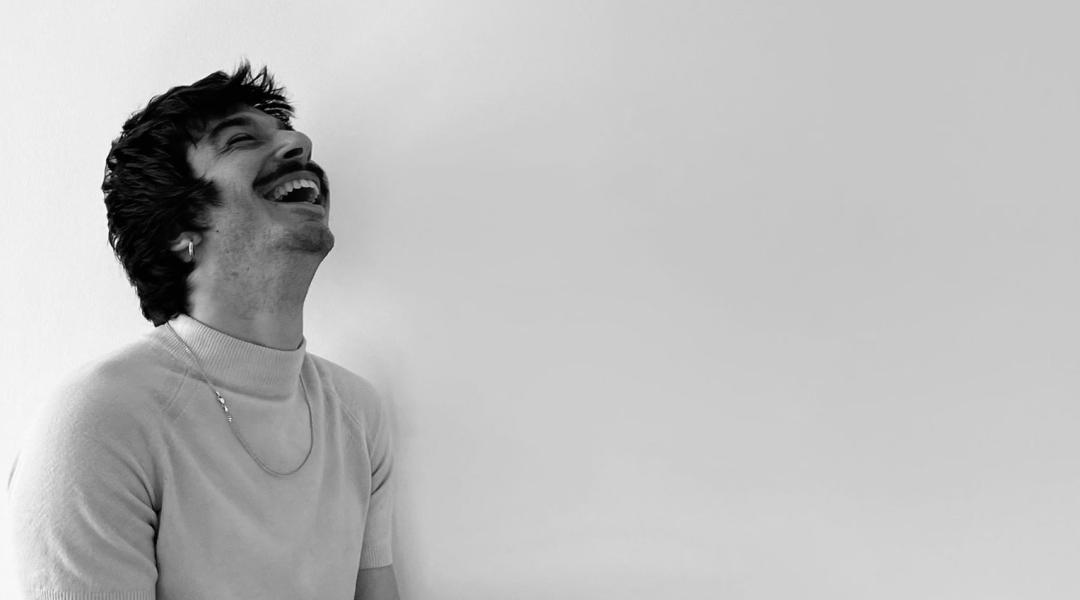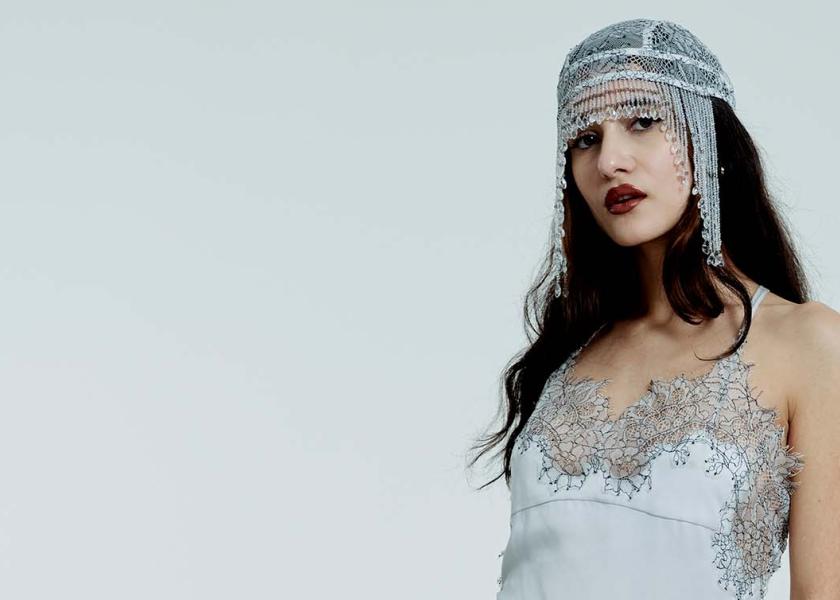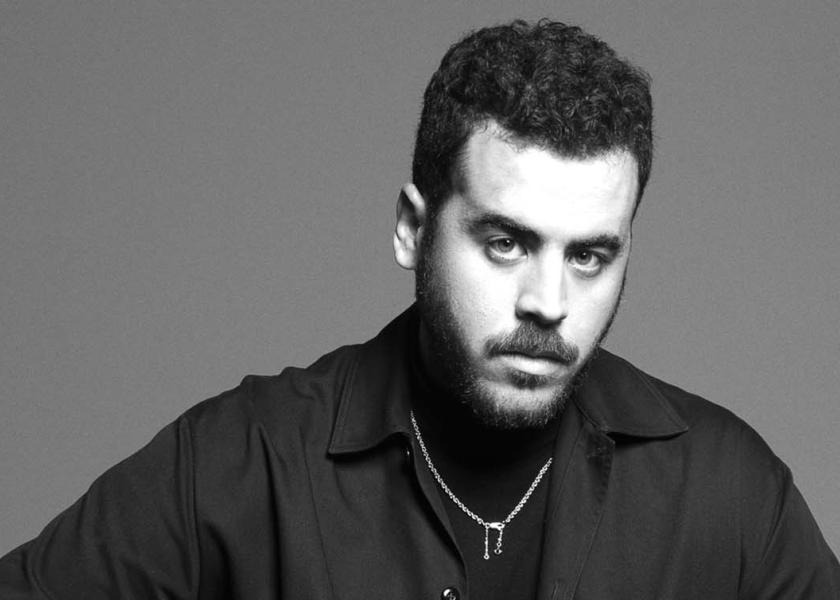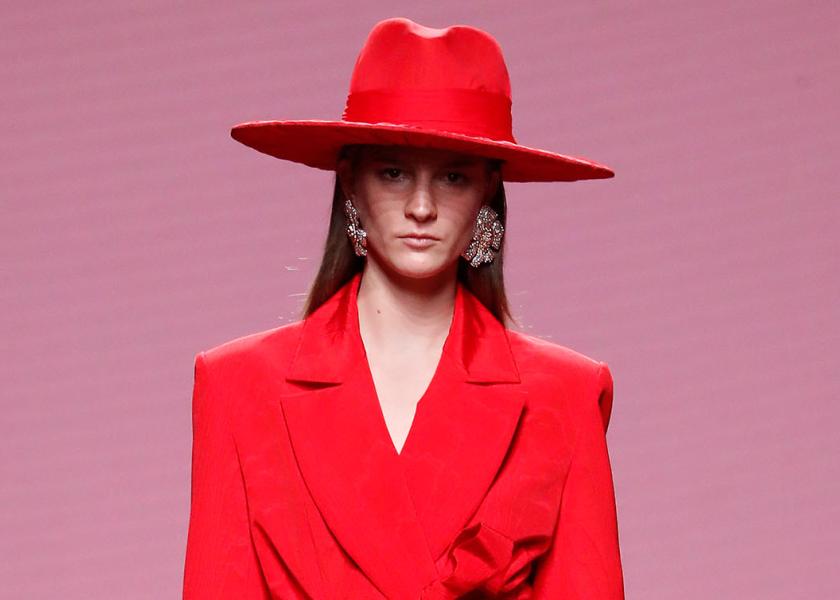Antonio Marcial
Genderless stitches

Three out of three. Three collections behind him, and all three launched at the 080 Barcelona Fashion digital fashion show. The latest, launched in April, as if it were just another chapter, joins a short but intense (textile) autobiography set to break traditional gender codes —silhouettes, lines, colours— and cut the invisible thread that still separates masculine and feminine.
Antonio Viéitez (Talavera de la Reina, 1993) was one of those people that made the most out of lockdown. While most of us didn’t know what to do with so many identical hours, during the summer of 2020 he created his own clothing brand and became the creative director of Antonio Marcial. Why Marcial and not Viéitez? “Because it’s my father’s name, a way to pay homage to him and thank him.”
This dressmaker is definitely forthcoming when it comes to expressing his feelings. In his first collection, Fresh and Bloody (April 2021), he delved into the drama of hiding wounds and the need to accept them to heal. In the second, Cruel and Soft (October 2021), he reflected on the violence we inflict on ourselves as well as on others. And in his third collection, Strangers and Rogues, recently launched at MACBA as part of the 29th edition of 080 Barcelona Fashion, he explores the anxiety of belonging and acceptance, inspired by 1990s fashion and multiple young subcultures. A creative career with a big social mark and a personal (and non-transferrable) discourse which has only just begun.
You finished studying Fine Arts at the Complutense University of Madrid, but then changed course towards fashion. Did you suddenly feel a calling?
Fashion was always there, but when I was little, I was a boy with the soul of an artist, so I wanted to explore classical arts before embarking on this discipline. I wanted to try drawing, sculpture, and discover myself creatively. When I finished, I knew I had to focus on fashion to express myself artistically.
“When the world stopped during lockdown, I realised it was time. I had the time, the name, the concept, the philosophy...”
After two years as a dressmaker and assistant designer for the brand Santiago Bandrés, you created your own brand in the middle of the pandemic. What did you do with your fears and doubts?
When the world stopped during lockdown, I realised it was time. I had the time and the name, and I was already working on the concept, philosophy, and the first designs for the brand, and I’d gained some experience at the studio. My fears and doubts were —and still are— there, but I had to try and carry on. I was stronger than those voices that discouraged me and I did it thanks to the hard work and support of my family and friends, which was essential.
And that’s how you became the creative director of Antonio Marcial. Tell us about your role.
Basically, I decide which direction I want the brand to take. I’m in charge of design and pattern design, of deciding its image on social media and on the runway... I also have a press team, a team of stylists, and a studio team, and I coordinate everyone to convey my ideas and bring them to life.
Your three collections talk about emotions and realities that shake us as individuals and as a society. Do you understand fashion as a story-telling medium?
Partly, yes. With the development of their collections, you can perceive the growth and learnings of any designer. Concepts and stories mature, the brand itself expands and is related to what came before. Someone’s work doesn’t need to follow the same storyline, but perceiving a personal story is inevitable.
So, a garment can tell a story?
I think the key is to convey concepts to a physical form and that can be achieved in multiple ways: through the pattern, fabric, finishes... In my case, I try to use pattern design elements and other components (cords and straps, for example) as tools to bring those concepts to life. I give these resources their own new meaning and use them to create a story. I also try to be consistent and respect those codes so that all the pieces are connected afterwards.
Antonio Marcial is a genderless brand. Tell us why this concept is so important to you.
I’m aware that there are multiple realities where people have felt forced or restricted in many areas of their lives, also in terms of fashion. And fashion, as the form of expression that it is, should be free and inclusive, and offer everyone the opportunity to be whoever and feel however they like, to express themselves as they wish, and convey the message that they feel most comfortable with. You achieve this by designing for all types of bodies, for diverse people.
Help us guess we’re face-to-face with one of your designs without knowing it.
Above all, and this is something people tell me a lot, the cords. I use them a lot decoratively and conceptually. They’re an element that I believe represents me and I love using them. Making a comparison with painting, they’d be like a pictorial resource, like an illustrator’s unique drawing style. Also straps and ropes.
“Fashion should be free and inclusive, and offer everyone the opportunity to convey the message that they feel most comfortable with”
Go out on a limb; do you think talent is something you’re born with?
I believe talent is indeed something you’re born with, but I’ve also seen people work really hard for years and develop it. Or more than develop it, discover it, and guide it towards their dreams.
Contemporary Spanish fashion exudes talent, how would you define its current mood?
Today, Spanish fashion is diverse, and that’s enlightening. The concept of gender is evolving, and fashion is increasingly reflecting this. Before, it was masculine and feminine, full stop.
Name some contemporary designers that inspire your talent.
I’m really inspired by Jacquemus. His lines, his philosophy, his colours... He’s a role model to me. Masha Popova is also an inspiration. Above all, the way she deconstructs patterns and fabrics, and how she experiments with fashion.
And finally, where do you dream your project will go?
I want to grow, to sell, to carry on working and see my designs on the street. I don’t know what the future will hold. I don’t know what projects await me. But I also didn’t know what to do when I started or the path I had in front of me. I want to move forward, see where my work takes me and, someday, dress Hunter Schafer, the co-star of Euphoria. I love her work and I love her.






